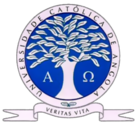Catholic University of Angola
| Universidade Católica de Angola UCAN |
|
|---|---|

|
|
| motto | Veritas Vita |
| founding | 1997/1999 |
| Sponsorship | Catholic Church |
| place | Palanca , Luanda |
| country |
|
| Students | 4,524 (2011) |
| Networks | FIUC |
| Website | www.ucan.edu |
The Catholic University of Angola ( Universidade Católica de Angola , UCAN ) is a Catholic institution in Angola , based in the state capital Luanda .
history
With the cabinet order of August 7, 1992, the Catholic Church was allowed to establish a Catholic university in Angola. The UCAN was approved and established on October 29, 1997 by the Catholic Bishops' Conference of Angola and São Tomé (CEAST) and began teaching on February 22, 1999. It was initially housed in the building of the Colégio São José de Cluny, in the historic center of Luanda, but moved to a campus in 2009/2010 that was newly built in the more peripheral Palanca district .
Goal setting
On the instructions of the Catholic Bishops' Conference of Angola and São Tomé, the university undertakes extensive teaching and research work . Her focus is on the promotion of human sciences , taking into account Christian values, and serves the promotion and development of the Angolan nation. It is also open to other religions, but these must correspond to Christian humanism .
organization
In 2011, 4,524 students are enrolled , the language of study is predominantly Portuguese, and English is offered as a second language. It is divided into four faculties : economics , law and engineering , it has no theological faculty or religious institute and does not receive any funding from the Catholic Church.
financing
In addition to the main sponsors (no government funds) from the USA , institutions from Portugal , South Africa , Norway , Spain and Italy are participating . The basic financing is provided by the Angola-based oil production companies from the above Countries, ensured and based on the delivery rates. These nations pay 15 US cents into a special fund for each barrel of oil produced (e.g., 300 million in 1998) .
Faculties
- Faculty of Social Sciences (Director: António Costa)
- Faculty of Law (Director: Adérito Correia)
- Faculty of Economics (Director: Justino Pinto de Andrade)
- Faculty of Engineering (Director: Aires Veloso)
Research centers
The most important research center of the university is the CEIC (Centro de Estudos e Investigação Científica, Center for Scientific Studies and Research), which has so far been exclusively focused on economics and social sciences and is under the direction of Manuel Alves da Rocha. In the Angolan university landscape, where comparatively little research is carried out, the CEIC has earned a considerable place through a series of publications and conferences. It is increasingly networked internationally, for example with the Christian Michelsen Institute of the University of Bergen , the Centro de Estudos Internacionais in the ISCTE Institute in Lisbon , the Center d'Études d'Afrique Noire of the Université de Bordeaux and others.
A center for surveys and opinion polls is attached to the CEIC. There is also a research center for religious and cultural issues that is currently being set up.
Web links
- UCAN website
- O País: UCAN - The Treasure of the Catholic Church January 8, 2010 (Portuguese)
Individual evidence
- ↑ a b Paulo de Carvalho, "Evolução e crescimento do ensino superior em Angola" , Revista Angolana de Sociologia [Online], 9 | 2012, online December 11, 2013. doi: 10.4000 / ras.422
- ↑ Members. In: www.fiuc.org. International Federation of Catholic Universities, accessed September 24, 2019 .
- ↑ Historial . Retrieved December 17, 2014.
- ↑ Universitetet i Bergen: Chr. Michelsen Institute . on www.uib.no (English, norsk)
- ↑ Instituto Universitário de Lisboa (ISCTE-IUL): CEI-IUL . on www.cei.iscte-iul.pt (Portuguese, English)
- ^ República Portuguesa: Regulamento do Centro de Estudos Internacionais (CEI-IUL) . Regulamento no. 305/2013. In: Diário da República , 2nd series, No. 153, 9 de agosto de 2013, pp. 25211-25215
Coordinates: 8 ° 51'26.3 " S , 13 ° 16'53.4" E